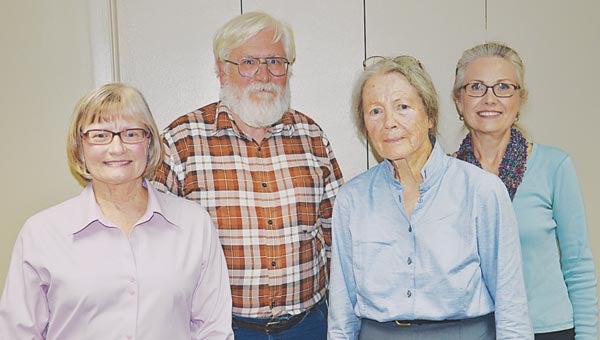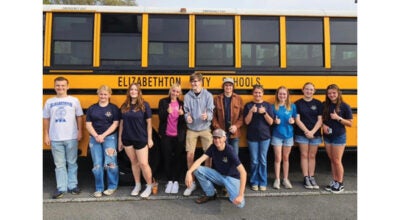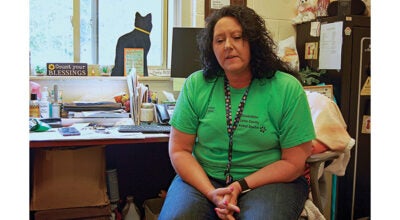Local contingent of Citizens Climate Lobby promotes fee and dividend policy
Published 9:13 am Tuesday, September 29, 2015

Star Photo/Rebekah Price Shelley Stahlman, Greg Lenske, Frances Lambert and Carol Landis of the Northeast Tennessee group of the Citizens Climate Lobby have been meeting with the staff of various newspapers, congressmen, district representatives and senators to educate about Carbon Fee and Dividend.
The Northeast Tennessee group of the Citizens Climate Lobby, active for over a year with more than 30 current members, is promoting its bi-partisan policy proposal Carbon Fee and Dividend (F&D) to senators, congressmen, district representatives, the press and the public to internalize the costs of burning carbon-based fossil fuels and to give citizens the ability to transition to using cleaner energy.
The proposal suggests a revenue-neutral carbon fee on carbon emissions and a monthly dividend check paid to all citizens. This is a market-based approach based on broad, well-developed analysis, members of the group told the Star Thursday. The fee would start $15 per ton of carbon emissions at the source, like at the mine or at the port of entry and would increase by $10 per ton each year.
In the past, regulations have been imposed on various fossil fuel industries to try to curb their production, but members of the CCL do not see this as a long term solution.
“Regulation always selectively targets an industry, but we all are contributors,” CCL member Frances Lamberts of Jonesborough said, adding that this proposal allows the market to decide.
It creates incentive for industries to move away from the use of fossil fuels and toward the use of cleaner energy such as solar, wind and hydroelectric.
This gives consumers the financial flexibility to switch to cleaner energy, it allows fossil fuel industries time to plan, adapt and invest in energy efficiency.
“As increases become calculable, there will be changes, but rather than that, this levels the playing field and allows industries to choose accordingly,” CCL member Carol Landis of Carter County said. “We don’t want to shut people down, we want to justly transition with good incentive.”
The CCL is four years old, and the proposal was created three years ago. Nationally, CCL chapters are active in 265 of the 435 congressional districts.
The group believe the cost of using fossil fuels is artificially cheap, meaning that the price does not reflect the damages it does.
“We know that the price of fossil fuels does not account for the costs to health, property or environment,” Lamberts said.
She mentioned California’s wildfires as an example, citing the millions spent to fight the fire, the homes lost and displaced persons, which likely result from a depleted ozone layer causing the solar radiation shield to be thinner and leading to subsequent drought in areas and higher rainfall and flooding in other areas.
“And the evidence of economic harm is great,” Lamberts said.
The group noted the cost of healthcare in heavily polluted areas, emergency management in climate-related disasters, agricultural costs related to lack of water and fire damage and other examples of social costs.
A nationwide macroeconomic study observing 160 industries–which encompass the entire economy–done by Regional Economic Modeling, Inc. determined that with F&D, annual additional GDP by 2035 would be $1.375 trillion higher than without F&D.
REMI was founded in 1980 and has done studies for the American Gas Association, the Nuclear Energy Institute, the National Federation of Independent Business, the National Education Association and a large number of other institutions.
In analysis of environmental impacts, it found that F&D would reduce US emissions to 69 percent of 1990 levels by 2025 and to 50 percent by 2035.
Lamberts said the most encouraging data found within the report by REMI showed that carbon dioxide emissions from power generation would decrease from over 80 percent of 2005 emissions to less than 10 percent by 2035 under F&D.
It found that 227,000 American lives would be saved in 20 years from avoided emissions.
The F&D model illustrates a 100 percent dividend, meaning that all of the fee money goes to families and individuals in the form of a dividend check, regardless of income, employment or other factors. This would be facilitated by the Treasury Department.
When people hear about a dividend check, skepticism is raised, however, the study determined that the average monthly dividend for a family of four would be almost to $200 by 2020 and up to $400 by 2035. The maximum cost of living increase by 2035 would be 1.7 to 2.5 percent, depending on the region.
When looking at US income per capita, after accounting for cost-of-living increases, it found that the average American would be wealthier every single year of the policy.
According to the REMI study, over one million jobs would be created within four years and over two million jobs would be created in nine years.
The biggest employment gains would be in healthcare, retail and other services, excluding public administration, and electricity generated from coal would be phased out by 2025.
According to CCL member Carol Landis, first steps that families could take with the dividend check would be to monitor energy consumption, use energy efficient lighting, turn off lights, insulate their homes better to avoid wasting heating and air, and when possible, invest in energy-efficient cars and power like solar.
“I think this is encouraging for families living paycheck to paycheck when they realize they can make a difference,” said Landis.
The Northeast Tennessee Chapter of CCL meets monthly at Covenant Presbyterian Church at 603 Sunset Drive, Johnson City. The next meeting is scheduled for October 10. For more information, contact Jerry Nagel at swnjwn@embarqmail.com or Ed Wolff at bbwolff1937@gmail.com.





